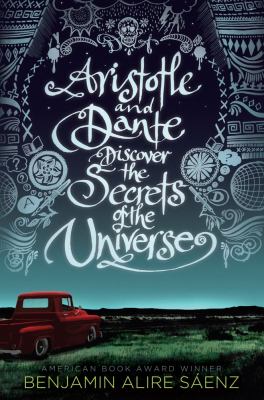
by Benjamin Alire S?enz
School Library Journal Gr 9 Up-In the summer of 1987 in El Paso, TX, two 15-year-old loners meet when Dante offers to teach Ari to swim, and they have a laugh over their unusual names. Though polar opposites in most aspects other than age and Mexican heritage, the teens form an instant bond and become inseparable. This poetic novel takes Ari, brooding and quiet, and with a brother in prison, and Dante, open and intellectual, through a year and a half of change, discovering secrets, and crossing borders from which there is no return. Two incidents, one in which Ari saves Dante's life and his family's temporary move to Chicago, help Dante understand that he is gay and in love with his friend. Yet, Ari can't cross that line, and not until Dante is hospitalized in a gay-bashing incident does he begin to realize the true depth of the love he has for him. With the help of his formerly distant, Vietnam-damaged father, Ari is finally able to shed his shame-the shame of his anger, of his incarcerated brother, of being different-and transition from boy to man. While this novel is a bit too literary at times for some readers, its authentic teen and Latino dialogue should make it a popular choice.-Betty S. Evans, Missouri State University, Springfield (c) Copyright 2012. Library Journals LLC, a wholly owned subsidiary of Media Source, Inc. No redistribution permitted. (c) Copyright 2010. Library Journals LLC, a wholly owned subsidiary of Media Source, Inc. No redistribution permitted. Publishers Weekly Fifteen-year-old Aristotle (Ari) has always felt lonely and distant from people until he meets Dante, a boy from another school who teaches him how to swim. As trust grows between the boys and they become friends (a first for Ari), Ari's world opens up while they discuss life, art, literature, and their Mexican-American roots. Additionally, the influence of Dante's warm, open family (they even have a "no secrets" rule) is shaping Ari's relationship with his parents, particularly in regard to a family secret; Ari has an older brother in prison, who no one ever mentions. In a poetic coming-of-age story written in concise first-person narrative, Saenz (Sammy and Juliana in Hollywood) crystallizes significant turning points in the boys' relationship, especially as Ari comes to understand that Dante's feelings for him extend beyond friendship. The story swells to a dramatic climax as Ari's loyalties are tested, and he confronts his most deeply buried fears and desires. It's a tender, honest exploration of identity and sexuality, and a passionate reminder that love-whether romantic or familial-should be open, free, and without shame. Ages 12-up. (Feb.) (c) Copyright PWxyz, LLC. All rights reserved. (c) Copyright PWxyz, LLC. All rights reserved Book list When Aristotle and Dante meet, in the summer of 1987, they are 15-year-olds existing in the universe between boys and men. The two are opposites in most ways: Dante is sure of his place in the world, while Ari feels he may never know who he is or what he wants. But both are thoughtful about their feelings and interactions with others, and this title is primarily focused on the back-and-forth in their relationship over the course of a year. Family issues take center stage, as well as issues of Mexican identity, but the heart of the novel is Dante's openness about his homosexuality and Ari's suppression of his. Saenz (Sammy and Juliana in Hollywood, 2004) writes toward the end of the novel that to be careful with people and words was a rare and beautiful thing. And that's exactly what Saenz does he treats his characters carefully, giving them space and time to find their place in the world, and to find each other. This moves at a slower pace than many YA novels, but patient readers, and those struggling with their own sexuality, may find it to be a thought-provoking read.--Kelley, Ann Copyright 2010 Booklist From Booklist, Copyright © American Library Association. Used with permission. |